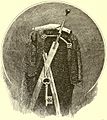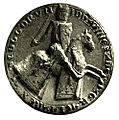Claymore facts for kids
Quick facts for kids Claymore |
|
|---|---|
| Type | Sword |
| Place of origin | Kingdom of Scotland |
| Service history | |
| In service | ca. 1400–1700 |
| Used by | Highland Scots |
| Specifications | |
| Mass | ≈2.2–2.8 kg (4.9–6.2 lb) |
| Length | ≈120–140 cm (47–55 in) |
| Blade length | ≈100–120 cm (39–47 in) |
|
|
|
| Blade type | Double-edged |
| Hilt type | Two-handed cruciform, with pommel |
The claymore is a famous Scottish sword. It has a blade that is sharp on both sides, which means it is "double-edged." The name "claymore" comes from a Gaelic word that means "great sword." This sword was indeed very big and needed two hands to hold and use it. Sometimes, people called the broad claymore sword "claidheamh da lamh," which means "two-hand sword." It was very popular in the 16th century. Scottish warriors, known as Highlanders, used these swords when fighting against the English.
Contents
What Was the Claymore Like?
The claymore sword was quite long. On average, it measured about 55 inches (1.4 metres) from end to end. The blade itself was about 42 inches (1.07 metres) long. It weighed around 5.5 pounds (2.5 kilograms). The blade was very wide. It also had a thin groove running down the middle. This groove helped to make the sword lighter and stronger.
Different Kinds of Claymores
There was also another type of Claymore sword. This version had a blade that was sharp on only one side. It also featured a special handle shaped like a basket. This basket-shaped handle was important for two reasons. First, it protected the user's hand during battles. Second, it helped to balance the very long blade.
These basket-hilted swords became very common around the mid-1600s. Many places in Scotland were known for making them. These included Edinburgh, Canongate, Stirling, and Glasgow.
Claymores and Armour
Around the year 1350, claymore swords started to become even longer. Both the handles and the blades grew in size. This change happened because warriors began wearing very heavy armour. This armour was incredibly strong and hard to cut through.
The Scottish Claymore was one of only two swords known for being able to cut through such heavy armour. The other sword that could do this was the Germanic Landsknecht sword from Germany. This shows how powerful and well-designed the Claymore was for its time.
Images for kids
-
Engraving of a claymore and armour at Dunvegan Castle (from Footsteps of Dr. Johnson, 1890).
-
A mid-sixteenth-century tomb effigy from Finlaggan
See also
 In Spanish: Claymore para niños
In Spanish: Claymore para niños




